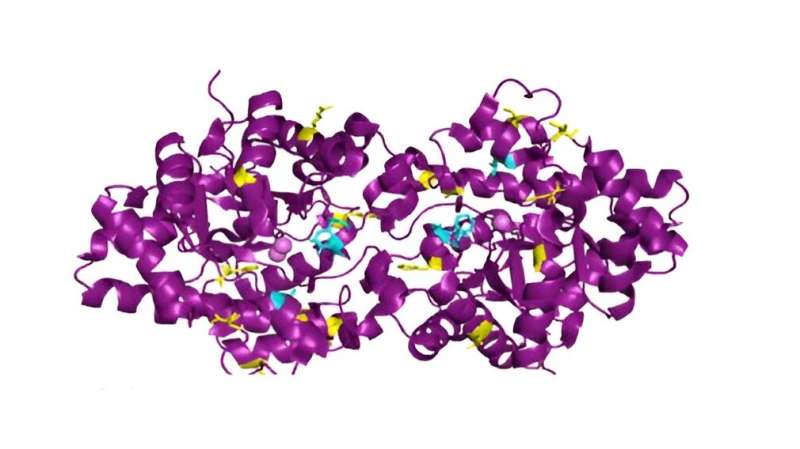This article has been reviewed according to Science X's editorial process and policies. Editors have highlighted the following attributes while ensuring the content's credibility:
fact-checked
trusted source
proofread
Research unveils biochemical defenses against chemical warfare

In the clandestine world of biochemical warfare, researchers are continuously seeking innovative strategies to counteract lethal agents. Researchers led by Jin Kim Montclare, Professor in the Department of Chemical and Biomolecular Engineering, have embarked on a pioneering mission to develop enzymatic defenses against chemical threats, as revealed in a recent study published in ChemistryOpen.
The team's focus lies in crafting enzymes capable of neutralizing notorious warfare agents such as VX, renowned for their swift and devastating effects on the nervous system. Through meticulous computational design, they harnessed the power of enzymes like phosphotesterase (PTE), traditionally adept at detoxifying organophosphates found in pesticides, to target VX agents.
The study utilized computational techniques to design a diverse library of PTE variants optimized for targeting lethal organophosphorus nerve agents. Leveraging advanced modeling software, such as Rosetta, the researchers meticulously crafted enzyme variants tailored to enhance efficacy against these formidable threats. When they tested these new enzyme versions in the lab, they found that three of them were much better at breaking down VX and VR. Their findings showcased the effectiveness of these engineered enzymes in neutralizing these chemicals.
A key problem in treating these agents lies in the urgency of application. In the event of exposure, rapid intervention becomes paramount. The research emphasizes potential applications, ranging from prophylactic measures to immediate administration upon exposure, underscoring the imperative for swift action to mitigate the agents' lethal effects.
Another key issue is protein stability—ensuring that the proteins can stay intact and at the site of affected tissue which is crucial for therapeutic applications. Ensuring enzymes remain stable within the body enhances their longevity and effectiveness, offering prolonged protection against chemical agents.
Looking ahead, Montclare's team aims to optimize enzyme stability and efficacy further, paving the way for practical applications in chemical defense and therapeutics. Their work represents a beacon of hope in the ongoing battle against chemical threats, promising safer and more effective strategies to safeguard lives.
More information: Jacob Kronenberg et al, Computational Design of Phosphotriesterase Improves V‐Agent Degradation Efficiency, ChemistryOpen (2024). DOI: 10.1002/open.202300263
Provided by NYU Tandon School of Engineering



















